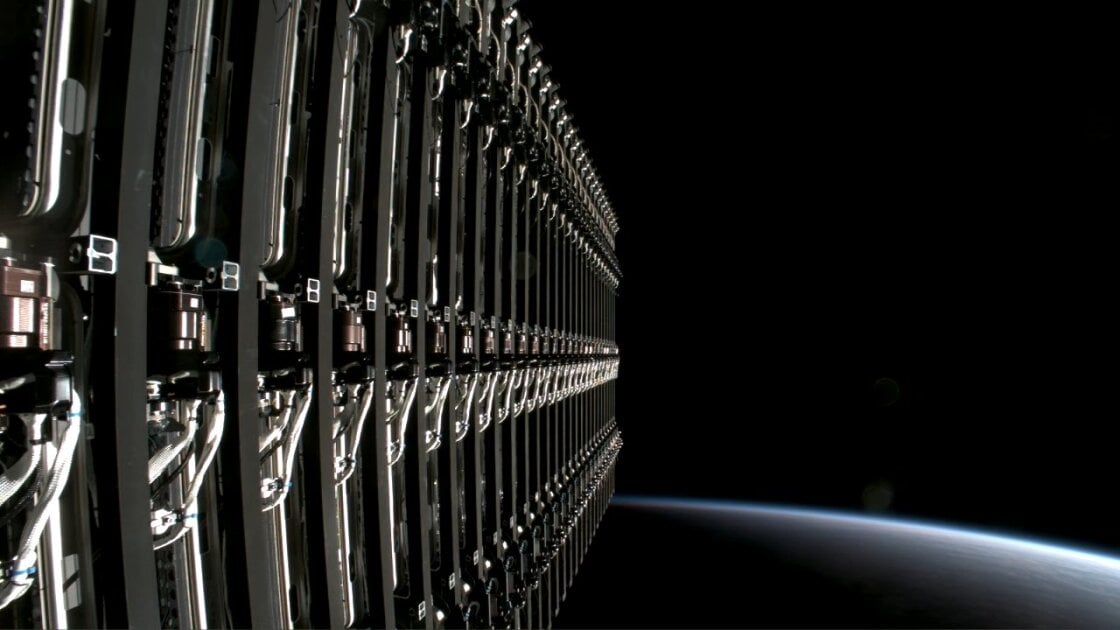Don’t miss out on our latest stories. Add PCMag as a preferred source on Google.
Starlink satellites are best known for supplying high-speed internet, but SpaceX CEO Elon Musk is suggesting they might one day also be used as orbiting data centers.
Creating a network of orbiting data centers would be no easy task. But according to Musk, SpaceX already has a foundation with the company’s next-generation V3 Starlink satellites, which are designed to beam gigabit internet. “Simply scaling up Starlink V3 satellites, which have high-speed laser links, would work,” he tweeted. “SpaceX will be doing this.”
(Credit: SpaceX)
This comes amid growing discussions about building power-hungry AI data centers in space to mitigate the environmental impact on Earth. SpaceX’s proposed V3 satellites require SpaceX’s Starship vehicle for launch, which is still in testing. An earlier regulatory filing from the company indicates that each V3 could weigh up to 2,000 kilograms (4,409 pounds), or almost four times the current mass of the V2 Mini Starlink satellites.
Musk’s tweet suggests SpaceX could make them even larger to host more built-in computing. A customer could then remotely connect to the Starlink satellites—which already possess high-speed connectivity—and run AI training workloads.
(Credit: SpaceX)
Musk’s reference to the high-speed laser links is also notable. One key challenge with operating any data center in space is remotely connecting to it, especially when the data center is continually circling the Earth, in and out of view for customers on the ground. However, SpaceX has already developed a solution using the built-in laser system on existing Starlink satellites, enabling them to transmit data at up to 200Gbps, thereby creating a mesh network in space.
Recommended by Our Editors
We’ll have to wait and see how SpaceX’s data center plans shake out at a time when the company already has its hands full with developing the Starship vehicle and sending humans to the Moon and Mars.
This Tweet is currently unavailable. It might be loading or has been removed.
In the meantime, a startup called Starcloud plans to launch its own test satellite into space, which will carry an Nvidia H100 GPU for AI training. The goal is to build a network of orbiting data centers that can connect to Starlink while harnessing the Sun as a natural power source. The test satellite is scheduled to fly on a SpaceX Falcon 9 rocket on Nov. 2, Starcloud’s CEO says.
Get Our Best Stories!
Your Daily Dose of Our Top Tech News

Sign up for our What’s New Now newsletter to receive the latest news, best new products, and expert advice from the editors of PCMag.
Sign up for our What’s New Now newsletter to receive the latest news, best new products, and expert advice from the editors of PCMag.
By clicking Sign Me Up, you confirm you are 16+ and agree to our Terms of Use and Privacy Policy.
Thanks for signing up!
Your subscription has been confirmed. Keep an eye on your inbox!
About Our Expert

Michael Kan
Senior Reporter
Experience
I’ve been a journalist for over 15 years. I got my start as a schools and cities reporter in Kansas City and joined PCMag in 2017, where I cover satellite internet services, cybersecurity, PC hardware, and more. I’m currently based in San Francisco, but previously spent over five years in China, covering the country’s technology sector.
Since 2020, I’ve covered the launch and explosive growth of SpaceX’s Starlink satellite internet service, writing 600+ stories on availability and feature launches, but also the regulatory battles over the expansion of satellite constellations, fights with rival providers like AST SpaceMobile and Amazon, and the effort to expand into satellite-based mobile service. I’ve combed through FCC filings for the latest news and driven to remote corners of California to test Starlink’s cellular service.
I also cover cyber threats, from ransomware gangs to the emergence of AI-based malware. Earlier this year, the FTC forced Avast to pay consumers $16.5 million for secretly harvesting and selling their personal information to third-party clients, as revealed in my joint investigation with Motherboard.
I also cover the PC graphics card market. Pandemic-era shortages led me to camp out in front of a Best Buy to get an RTX 3000. I’m now following how President Trump’s tariffs will affect the industry. I’m always eager to learn more, so please jump in the comments with feedback and send me tips.




